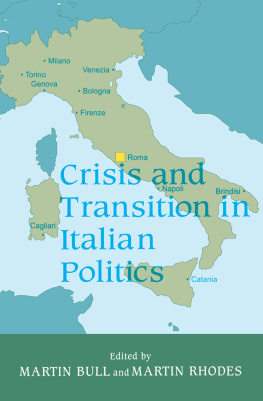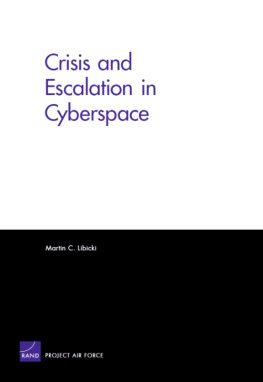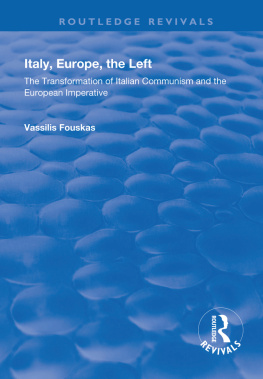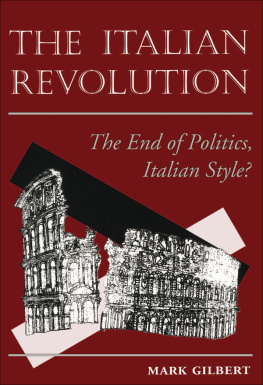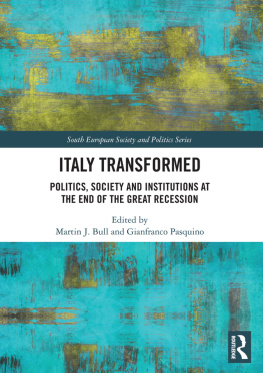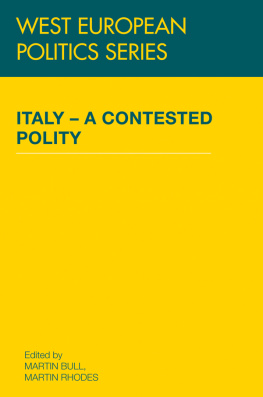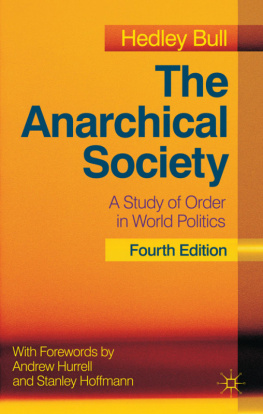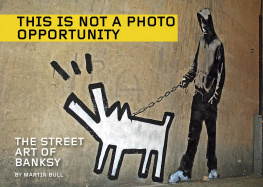CRISIS AND TRANSITION IN ITALIAN POLITICS
BOOKS OF RELATED INTEREST
Southern European Welfare States: Between Crisis and Reform
edited by Martin Rhodes
The Euro-Mediterranean Partnership: Poolitical and Economic Perspectives
edited by Richard Gillespie
The State in Western Europe: Retreat or Redefinition?
edited by Wolfgang C. Mller and Vincent Wright
The Regions and the European Community
edited by Robert Leonardi
The Regional Dimension of the European Union
edited by Charlie Jeffery
National Parliaments and the European Union
edited by Philip Norton (new in paperback)
The Crisis of Representation in Europe
edited by Jack Hayward
The Politics of Immigration in Western Europe
edited by Martin Baldwin-Edwards and Martin A. Schain
CRISIS AND TRANSITION IN ITALIAN POLITICS
Edited by
Martin Bull
and
Martin Rhodes
First published 1997
by FRANK CASS & COMPANY LTD
Published 2013 by Routledge
2 Park Square, Milton Park, Abingdon, Oxon OX14 4RN
711 Third Avenue, New York, NY, 10017, USA
Routledge is an imprint of the Taylor & Francis Group, an informa business
Copyright 1997 Frank Cass & Co. Ltd.
Library of Congress Cataloging-in-Publication Data
A catalog record of this book is available from the Library of Congress
British Library Cataloguing in Publication Data
Crisis and transition in Italian politics
1. Italy Politics and government 1976
I. Bull, Martin J. II. Rhodes, Martin III. West European politics
320.9'45
ISBN 13: 978-0-714-64816-3 (hbk)
ISBN 13: 978-0-714-64366-3 (pbk)
This group of studies first appeared in a Special Issue on Crisis and Transition in Italian Politics in West European Politics, Vol.20, No.1, January 1997 published by Frank Cass & Co. Ltd.
All rights reserved. No part of this publication may be reproduced, stored in a retrieval system or transmitted in any form, or by any means, electronic, mechanical, photocopying, recording, or otherwise, without the prior permission of the publisher.
Typeset by
Vitaset, Paddock Wood, Kent TN12 6HF
Contents
Martin Bull and Martin Rhodes |
Vincent della Sala |
Gianfranco Pasquino |
Martin Rhodes |
James J. Newell and Martin Bull |
Roberto DAlimonte and Stefano Bartolini |
Luca Ricolfi |
Carlo Guarnieri |
Bruno Dente |
Giacinto della Cananea |
Marino Regini and Ida Regalia |
Maurizio Ferrera |
MARTIN BULL and MARTIN RHODES
The last special issue of West European Politics devoted to Italian politics was published in 1979.1 The timing of that issue was apposite. It came at the end of a decade of social, economic and political crisis in which Italy was portrayed as the sick man of Europe. Yet, the originality of that issue lay in its challenge to much of the existing literature which sought to portray Italy as an anomaly among west European democracies. It showed that, despite its unique features, the politics of Italy were, in many ways, comparable to those of other nations.
Fifteen years on, few would question the need for a further special issue on Italian politics. This is not just because much has changed since 1979, but more specifically, because so much has appeared to change since 1989. Indeed, it could be argued that, despite the significance of the 1979 issue and of the social science research on Italy it helped to generate, something analogous to a popular portrayal of Italy is happening in many of the analyses of Italy today. The dramatic developments since 1989 and the crisis which has resulted have generated a new focus on the country, yet this has to a large extent been dominated by the idea, particularly prevalent in the early 1990s, that Italy has been undergoing a revolution, and that, once again, there is something unique about democracy allItaliana.
Any analysis of political change which focuses only on this period is bound to be reductive and incomplete. This new special issue on Italian politics seeks to analyse the last decade and a half of Italian political development through the prism of the changes of the 1990s. The 1990s will, inevitably, be seen as a watershed decade in Italian political development. Yet, contrary to the popular portrayal of these changes as revolutionary, these years have witnessed considerable continuity beneath the surface change, making the contemporary period one of ongoing transition rather than rupture with the past. This is not to deny the significance of recent changes. On the contrary, by exploring developments over the past 15 years across a range of sectors and areas, the authors in this collection seek to identify the deep trends of political change in Italys transition beneath the ephemera of day-to-day political life the focus of much current analysis. They reveal a political system that is both dynamic and sclerotic, adaptable and blocked, and with a surprising degree of institutional inertia. Thus while some aspects of the system are adjusting to the new challenges of the decade, other areas are adapting much more slowly, despite the headline-grabbing political upheavals of recent years. Indeed, paradoxically, it is those areas which appear to have witnessed the most dramatic changes (and specifically the political parties) which are proving to be most dilatory in driving Italys transition forward. This combination of vigour and stagnation lies at the heart of the Italian paradox; and while the transition remains incomplete, so the crisis will continue. The aim of this introduction is to explore briefly the nature of this paradox.
THE ITALIAN MODEL
Although all of the articles in this collection focus uniquely on the Italian situation, a number of preliminary points should be made about the comparative dimension. For despite the fact that Italy, like other European countries, has been made the subject of comparative research which has countered, as already noted, the idea that Italy was an anomalous case among western democracies something may have been lost by the tendency to search for the comparable at the expense of the particular. This point was already made in the 1980s by those who argued for the existence of a southern model of democracy against those who argued that, in broad comparative terms, no such model existed.2 Yet if there was nothing special about Italian democracy let alone that of the other countries of southern Europe which underwent a process of political and economic modernisation much later then how do we make sense of the upheavals of the last few years? Why is the transition towards what is popularly called the Second Republic presented by many Italian commentators as a normalisation of Italian politics and a progressive move into the European mainstream proving so difficult? This raises a second question: if Italy is in transition, what is it moving away from and where, precisely, is it heading?
To argue that the Italian situation has more in common with that of the newly democratising countries of central and eastern Europe than with other western democracies is clearly to overstate the case. In terms of foreign politics, Italy is hardly an outsider in the western democratic camp. Italy is a founder member of the European Union (EU) and an ardent promoter of greater European integration; it is a long-standing and committed member of the western alliance; its economy is deeply integrated with those of its EU partners and it is a signatory of the international agreements that regulate trade, labour and human rights in the west. In domestic political terms, it would be a mistake to underestimate Italys democratic credentials: it has a set of well-established and respected constitutional norms, a strong party system, a high level of political participation (party membership and voter turnout) and vibrant associational and political sub-cultures.


